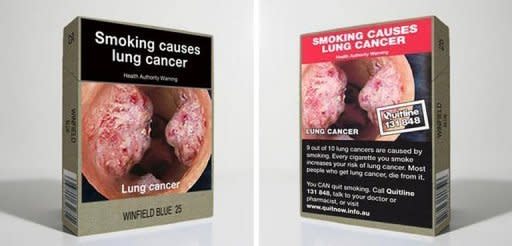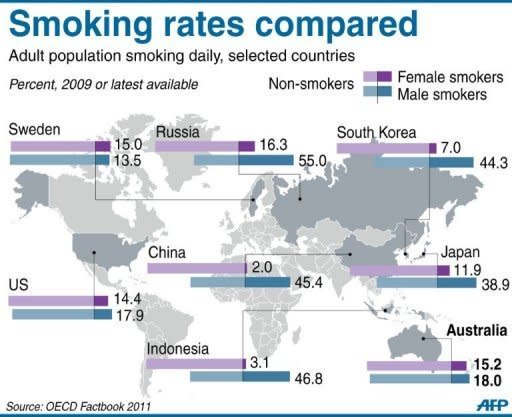Tobacco firms lose Australia plain packet case
Global tobacco firms lost a "watershed" court challenge to Australia's plain packaging laws for cigarettes on Wednesday in a closely-watched case health advocates said would have a worldwide impact. The High Court of Australia ruled the measures, stipulating that tobacco products should be sold in drab, uniform packaging with graphic health warnings from December 1 this year, did not breach the country's constitution. Four companies led by British American Tobacco (BAT) had challenged the law, claiming it infringed their intellectual property rights by banning brands and trademarks from packets, and was unconstitutional. But the court rejected the argument by BAT, Japan Tobacco International, Imperial Tobacco and Philip Morris that the law represented "an acquisition of (their) property otherwise than on just terms". "At least a majority of the court is of the opinion that the Act is not contrary to (Australia's constitution)," the court said in a brief notice of judgement. The court's full reasons will be delivered at a later date, and the tobacco firms were ordered to pay the government's legal costs. They cannot appeal further in the Australian legal system. Canberra estimates there are 15,000 deaths nationally each year from tobacco-related illnesses and that smoking costs more than Aus$30 billion (US$31.4 billion) a year in healthcare and lost productivity. The World Health Organization welcomed the decision and hoped it would have a "domino effect" in other countries. "The industry's attempt to derail this effective tobacco control measure failed," said the UN health agency's director general Margaret Chan. "Plain packaging is a highly effective way to counter industry's ruthless marketing tactics," she added. Australia's Attorney-General Nicola Roxon said the case was "a victory for all those families who have lost someone to a tobacco related illness" and should be a "clarion call to every country grappling with the costs and harm of tobacco". "This is a watershed moment for tobacco control around the world," she said in a statement. Britain, Canada and New Zealand are mulling similar measures, and Roxon said China, South Africa and the European Union were also following the Australian case with interest. "With so many countries lined up to ride on Australia's coattails, what we hope to see is a domino effect for the good of public health," she said. Mike Daube, head of an expert panel that originally recommended plain packaging to Canberra, said it was "the biggest defeat for the global tobacco industry that I've seen in 40 years". "Now this decision's through I think we're going to see plain packaging in the UK, we're going to see it in New Zealand, we're going to see it in Norway," he told Sky News. "It really is the tobacco industry's worst nightmare come true." BAT said it would respect the "bad law", but warned it would cause black-market cigarette sales to skyrocket as the packaging would be easy to fake and so "only benefit organised crime groups". Philip Morris noted that a number of other legal challenges had been launched, including a case in Hong Kong alleging the law breached Australia's bilateral investment treaty with the Chinese territory. "The legality of plain packaging, including whether Australia will have to pay substantial compensation to Philip Morris Asia, remains at issue and will be considered in other ongoing legal challenges," said spokesman Chris Argent. Australia is also facing formal complaints at the World Trade Organization over the plan from countries including Honduras, Ukraine and the Dominican Republic. Roxon said Wednesday's decision would "only improve the government's ability to defend strongly any actions that are taken in international forums". But Philip Morris said it would have "no legal bearing on these international cases or on other jurisdictions" and it believed the Hong Kong and WTO challenges were on a strong footing. A combo of handout images, released by the Australian Government Department of Health and Ageing in 2010, shows both sides of a generic cigarette packaging with health warnings taking up 85% of the pack and a minimal border. Tobacco firms lost a "watershed" court challenge to Australia's plain packaging laws for cigarettes in a case health advocates said would have a worldwide impact. Graphic showing the propoportion of the population smoking daily in selected countries. Tobacco firms lost a "watershed" court challenge to Australia's plain packaging laws for cigarettes in a case health advocates said would have a worldwide impact.

